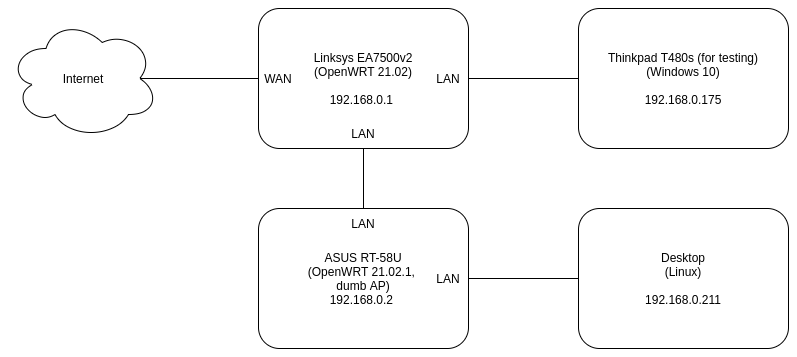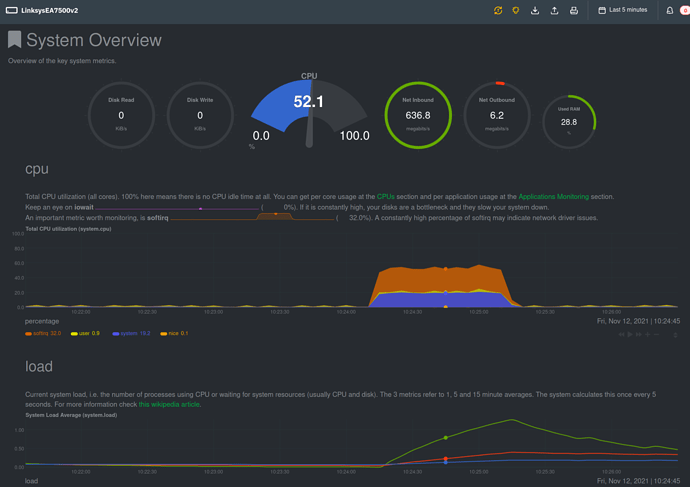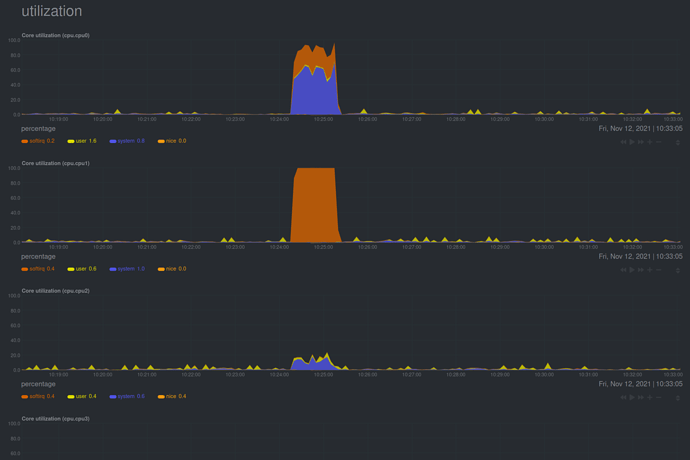I found very interesting results testing the speed of OpenWRT routers using iPerf3
Set-up:
All devices are wired through Gigabit ethernet. iPerf3 server was run with command iperf3 -s on the "router", "dump AP", and my notebook computer temporarily connected for testing. The desktop PC was the client with command iperf3 -c <IP address>
Results:
$ iperf3 -c 192.168.0.1
Connecting to host 192.168.0.1, port 5201
[ 5] local 192.168.0.211 port 56272 connected to 192.168.0.1 port 5201
[ ID] Interval Transfer Bitrate Retr Cwnd
[ 5] 0.00-1.00 sec 45.0 MBytes 377 Mbits/sec 0 969 KBytes
[ 5] 1.00-2.00 sec 35.0 MBytes 294 Mbits/sec 0 969 KBytes
[ 5] 2.00-3.00 sec 35.0 MBytes 294 Mbits/sec 0 969 KBytes
[ 5] 3.00-4.00 sec 35.0 MBytes 294 Mbits/sec 0 969 KBytes
[ 5] 4.00-5.00 sec 35.0 MBytes 294 Mbits/sec 0 969 KBytes
[ 5] 5.00-6.00 sec 35.0 MBytes 294 Mbits/sec 0 969 KBytes
[ 5] 6.00-7.00 sec 36.2 MBytes 304 Mbits/sec 0 969 KBytes
[ 5] 7.00-8.00 sec 35.0 MBytes 294 Mbits/sec 0 969 KBytes
[ 5] 8.00-9.00 sec 35.0 MBytes 294 Mbits/sec 0 969 KBytes
[ 5] 9.00-10.00 sec 35.0 MBytes 294 Mbits/sec 0 969 KBytes
- - - - - - - - - - - - - - - - - - - - - - - - -
[ ID] Interval Transfer Bitrate Retr
[ 5] 0.00-10.00 sec 361 MBytes 303 Mbits/sec 0 sender
[ 5] 0.00-10.09 sec 359 MBytes 299 Mbits/sec receiver
iperf Done.
$ iperf3 -c 192.168.0.175
Connecting to host 192.168.0.175, port 5201
[ 5] local 192.168.0.211 port 54612 connected to 192.168.0.175 port 5201
[ ID] Interval Transfer Bitrate Retr Cwnd
[ 5] 0.00-1.00 sec 115 MBytes 963 Mbits/sec 0 210 KBytes
[ 5] 1.00-2.00 sec 111 MBytes 935 Mbits/sec 0 210 KBytes
[ 5] 2.00-3.00 sec 111 MBytes 935 Mbits/sec 0 210 KBytes
[ 5] 3.00-4.00 sec 111 MBytes 933 Mbits/sec 0 210 KBytes
[ 5] 4.00-5.00 sec 112 MBytes 936 Mbits/sec 0 210 KBytes
[ 5] 5.00-6.00 sec 112 MBytes 940 Mbits/sec 0 210 KBytes
[ 5] 6.00-7.00 sec 112 MBytes 940 Mbits/sec 0 210 KBytes
[ 5] 7.00-8.00 sec 113 MBytes 945 Mbits/sec 0 210 KBytes
[ 5] 8.00-9.00 sec 112 MBytes 943 Mbits/sec 0 210 KBytes
[ 5] 9.00-10.00 sec 113 MBytes 945 Mbits/sec 0 210 KBytes
- - - - - - - - - - - - - - - - - - - - - - - - -
[ ID] Interval Transfer Bitrate Retr
[ 5] 0.00-10.00 sec 1.10 GBytes 941 Mbits/sec 0 sender
[ 5] 0.00-10.00 sec 1.10 GBytes 941 Mbits/sec receiver
iperf Done.
$ iperf3 -c 192.168.0.2
Connecting to host 192.168.0.2, port 5201
[ 5] local 192.168.0.211 port 52910 connected to 192.168.0.2 port 5201
[ ID] Interval Transfer Bitrate Retr Cwnd
[ 5] 0.00-1.00 sec 108 MBytes 906 Mbits/sec 0 352 KBytes
[ 5] 1.00-2.00 sec 111 MBytes 931 Mbits/sec 0 352 KBytes
[ 5] 2.00-3.00 sec 111 MBytes 931 Mbits/sec 0 352 KBytes
[ 5] 3.00-4.00 sec 111 MBytes 931 Mbits/sec 0 352 KBytes
[ 5] 4.00-5.00 sec 112 MBytes 937 Mbits/sec 0 423 KBytes
[ 5] 5.00-6.00 sec 112 MBytes 937 Mbits/sec 0 423 KBytes
[ 5] 6.00-7.00 sec 112 MBytes 938 Mbits/sec 0 423 KBytes
[ 5] 7.00-8.00 sec 99.8 MBytes 837 Mbits/sec 0 443 KBytes
[ 5] 8.00-9.00 sec 112 MBytes 936 Mbits/sec 0 467 KBytes
[ 5] 9.00-10.00 sec 112 MBytes 941 Mbits/sec 0 467 KBytes
- - - - - - - - - - - - - - - - - - - - - - - - -
[ ID] Interval Transfer Bitrate Retr
[ 5] 0.00-10.00 sec 1.07 GBytes 923 Mbits/sec 0 sender
[ 5] 0.00-9.93 sec 1.07 GBytes 927 Mbits/sec receiver
iperf Done.
The results are very interesting. Gigabit speed was not reached when iperf-ing the router itself. However, the problem is not due to the connections as near-gigabit speed was achieved when iperf-ing the notebook, which is connected to the same router as the desktop. I don't think it is particularly related to the default configuration in OpenWRT as well, as near-gigabit speed was achieved when iperf-ing the "dump AP" which is also running OpenWRT.
Speedtest.net, when run from the desktop, also reported around ~900Mbps speed. (I'm on a 1000Mbps fibre connection)
Any ideas/pointers in diagnosing such a problem? Thank you.



